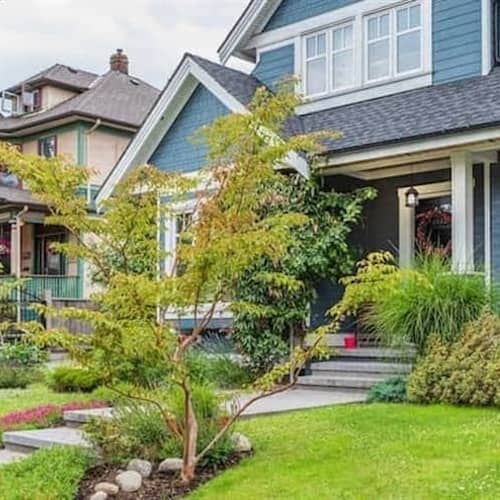Earnest money: What is it and how much is enough?
Contributed by Karen Idelson
Sep 9, 2025
•10-minute read

Buying a home is a long process. It’s not unusual for it to take weeks or even months, depending on the market and other factors. The same is true for sellers, who have to put in a lot of time and effort from the time they list their home to the time they sell it.
The last thing a seller wants is to accept an offer from someone who wants to buy their house, only for the buyer to walk away from the deal weeks later. It’d be a lot of wasted effort and time.
That's why most buyers offer earnest money when they make an offer to buy a house. Earnest money is an upfront payment that goes toward the home’s eventual sale price and shows the seller that the buyer is serious about completing the purchase.
What is earnest money in real estate?
When someone makes an offer to buy a home, they will typically provide an amount of earnest money along with the offer.
Offering earnest money shows the seller that you’re serious about buying the home and demonstrates that you have the money to close the deal.
If the seller accepts your offer, your earnest money typically gets deposited into an escrow account. If you back out of the deal for a reason that isn’t covered by a contingency in your offer, the seller gets to keep the earnest money. If the sale is completed, the earnest money is put toward the purchase price of the home.
Sellers expect people to offer earnest money because it shows they really mean to go through with the home purchase. Taking a home off the market and going through the closing process takes time and effort, so earnest money assures sellers that the buyer intends to go through with the deal.
How much do you need to pay in earnest money?
Earnest money is typically around 1% to 3% of the sale price and is held in an escrow account until the deal is complete. The exact amount depends on what's customary in your market.
For example, if your area has very low housing inventory, larger amounts of earnest money may be more common than smaller amounts. Offering closer to the 3% amount can even help you win your bid because it shows sellers that you have the money to close the deal. Most buyers do not have the resources to buy a house with cash, but it’s still important to present a strong offer to the seller.
What happens to earnest money at closing?
When a seller accepts your offer to buy a home, the earnest money you supply gets put into an escrow account.
If the closing process goes smoothly, then the earnest money gets disbursed from escrow to the seller and is applied toward the purchase price of the home, usually as part of the down payment or closing costs.
If the process does not go smoothly, such as due to a failed home inspection, what happens depends on the details of your offer to buy the home. If you included contingencies, legal requirements that the seller or the home must meet for the sale to complete, you may be able to back out of the purchase and get your earnest money back.
Buyers who back out of a deal for a reason not covered by a contingency included in their offer will lose both the home and their earnest money.
Why should you pay earnest money?
The primary reason to pay earnest money is to show sellers that you’re serious about buying their home and that you’re willing to deal with financial consequences should the deal fall through due to not adhering to the contract.
If you don’t offer earnest money, sellers might worry that you’ll walk away from the deal and the seller will have lost time by taking their house off the market. After all, without earnest money, you wouldn’t lose anything but some time by walking out on the deal.
In particularly competitive markets, a larger amount of earnest money can help make your offer more appealing.
It should be noted that earnest money is different than a down payment, which is a large lump sum of money that is paid toward the purchase price of the house and that lowers the amount of the loan needed to buy the house.
The obvious drawback of earnest money is that you’re taking a risk. If you don’t include the right contingencies in your offer and decide to walk away from the deal, you’ll lose whatever money you put down.
How Verified Approval could help
If you’re looking to make your offer to buy a home more appealing to sellers, you can consider getting a Verified Approval from Rocket Mortgage®.
With Verified Approval, Rocket collects documentation from you and checks your credit score, then has an underwriter review this information. The underwriter can then provide you with information on what kind of loan you can qualify for and how much you could borrow. If you qualify, you will be given a Verified Approval Letter (VAL) which can be used to show that you’ve had your income, assets, and credit confirmed and manually reviewed by the underwriting team. The document also states that you qualify for a mortgage up to a specific amount.
Think of it as an even stronger version of a mortgage pre-approval. Verified Approval, along with earnest money, shows sellers that you’re both serious about buying a home and financially capable of doing so.
When is earnest money refundable?
Earnest money is refundable depending on the terms of your contract. This is why you should always include contingencies, which are conditions that must be met for the process to move forward.
If one of the contingencies included in your offer is not met, you can walk away and get your earnest money back.
These are some of the most common contingencies that people include in offers to buy a home.
Home inspection contingency
A home inspection contingency lets the buyer hire a home inspector to examine the property. If the inspector finds major defects or necessary repairs that would cost more than a set amount, the buyer could back out of the deal.
Appraisal contingency
As part of the underwriting process, mortgage lenders send a professional appraiser to inspect a home and determine a fair value for it. If a home does not appraise for a sufficient value, the lender may not approve the loan because the home won’t serve as sufficient collateral.
If you include an appraisal contingency, you may be able to back out and get your money back if the appraisal comes in below value.
Financing contingency
Most people get a mortgage to buy a home because they can’t afford to pay hundreds of thousands of dollars upfront to buy a house. For this reason, a financing contingency is essential in almost any offer to buy a home.
If you make reasonable efforts to qualify for a loan but find yourself denied, a financing contingency lets you back out of the deal and get your earnest money back. Without this contingency, failing to qualify for a loan would see you losing your earnest money and possibly other consequences, depending on the contract.
Contingency for selling an existing home
If you already own a home and are moving, you may include a contingency that you won’t complete the purchase until you sell your existing home. This is especially common if you’re planning to use proceeds from the sale of your previous home to fund the purchase of the new one.
With this contingency, you can recover your earnest money if you’re not able to sell your old home and can’t fund the new purchase.
Should you waive a contingency?
Most home buyers should never waive a contingency because the risks involved are serious. For example, if you waive a home inspection contingency, you could wind up buying a home that needs tens or hundreds of thousands of dollars in repairs.
It might be tempting to waive contingencies in a competitive real estate market, but you should consider the risks and get advice from a real estate and/or legal expert before doing so.
Tips to protect your earnest deposit
Providing earnest money means taking a risk, so it’s important to take steps to protect your earnest deposit, especially in competitive markets where you’re likely offering a larger amount.
1. Use an escrow account
The most important thing to do to protect your earnest money is to use an escrow account. An escrow account is held and controlled by a third party rather than you or the home seller.
This ensures the seller doesn’t try to walk away with your money. It also protects the seller because you’ve already handed over the deposit and can’t get it back without good reason, such as a failed contingency.
2. Know your contingencies
Whenever you’re trying to buy a home, it’s important to work with an experienced real estate professional. They can help you draft your offer to purchase a property and give you information about the contingencies you should include.
Make sure you know what contingencies you’ve included, such as a financing contingency or inspection contingency, and the conditions that will let you get your earnest money back.
3. Stay on track with your responsibilities
Making an offer to buy a home is an early step in the home-buying process. It can take weeks from the time your offer is accepted to the time you buy the home, and you have a lot to do during that time, such as scheduling an inspection, finishing your loan application, sending documents to the right places, and so on.
If you don’t keep up your end of the deal, the seller may cancel the sale and keep your earnest deposit, depending on the terms of the contract, so be sure to keep close track of what you need to do and when it needs to be done to keep the process moving forward.
4. Put everything in writing
With any major financial transaction, it’s important to have everything in writing so that both parties can plainly see the details of the earnest money deposit and the sale process.
There are many common real estate scams, so proper documentation of any conversations and agreements can help keep all the parties protected.
Example: Earnest money in practice
These examples will provide a good illustration of how earnest money works and why it can be helpful for home buyers to offer an earnest deposit.
Situation A: The forfeited deposit
Alex, Taylor, and Sam are all selling their homes. Charlie is a home buyer who has looked at all three houses and wants one of them but can't quite decide which one.
Charlie doesn't want to decide on a single house just yet and makes a good-faith deposit on all three houses. Alex, Taylor, and Sam each take their homes off the market and inform their other potential buyers that Charlie wants the house.
Later, Charlie decides to buy Alex’s house. Taylor and Sam now have to put their homes back on the market and start looking for buyers all over again. Luckily, Charlie’s earnest deposits are Taylor’s and Sam’s to keep. This offers them some compensation for the time and money they lost due to Charlie backing out of the sales.
Situation B: The contingency option
Charlie makes a single deposit to Alex but discovers the house is infested with cockroaches after a professional home inspection. Luckily, Charlie has a home inspection contingency in the purchase agreement and decides not to buy. Because of this contingency, Charlie gets the earnest money deposit back from Alex. Charlie is then able to make an offer on Sam’s house with the money.
Situation C: The failed offer
Charlie makes an offer to buy Sam’s house in a competitive market and makes an earnest money deposit. Once they accept the offer, Sam turns down other competitive offers from other buyers. To secure an offer, Charlie offered to waive any contingencies when making their offer. Unfortunately, a sudden financial downturn causes the housing market to cool, and Charlie loses his job.
The job loss means that Charlie is unable to get final approval for a mortgage and withdraws his offer. Because there were no contingencies in place, Charlie is required to forfeit their earnest money deposit.
While this is unfortunate for both parties, Sam is able to keep the earnest money to help cover the potential losses from not being able to sell his house sooner. Charlie is also protected against potentially being sued for breach of contract.
FAQ
Before you buy a home, make sure you understand earnest money. These questions and answers can help.
Who keeps earnest money at closing?
When you close on a home, the earnest money you offered goes to the seller and is applied to the purchase price of the home. For example, if you gave a deposit of $5,000 and need to make a $10,000 down payment, you’d only provide $5,000 at closing, using the earnest money to cover the rest of the down payment.
Can I back out after giving earnest money?
Yes, you can back out of a home purchase at any time, including after giving earnest money. However, if you don’t have a good reason for doing so, you may have to forfeit the earnest deposit.
Can I get my earnest money back if my loan is denied?
You may be able to get your earnest money back if you fail to qualify for a loan, depending on the terms of your contract. If you included a financing contingency in your offer to buy the home, you’ll be able to get the money back. Without a financing contingency, the seller can keep the deposit.
The bottom line: A decent amount of earnest money can make a difference
Earnest money is an upfront deposit you make to show a home seller that you’re serious about buying their home. If you decide to walk away from the deal without a good reason, the seller gets to keep the deposit.
When making an offer to buy a home, earnest money can make your offer more competitive. It’s important to include contingencies in your offer and to follow best practices, such as using an escrow account, to protect your earnest money.
If you’re looking for ways to make your offers more appealing to home sellers, consider Verified Approval from Rocket Mortgage®.

TJ Porter
TJ Porter has ten years of experience as a personal finance writer covering investing, banking, credit, and more.
TJ's interest in personal finance began as he looked for ways to stretch his own dollars through deals or reward points. In all of his writing, TJ aims to provide easy to understand and actionable content that can help readers make financial choices that work for them.
When he's not writing about finance, TJ enjoys games (of the video and board variety), cooking and reading.
Related resources

5-minute read
Solid offers come with a Verified Approval Letter
A Verified Approval Letter shows the seller that your offer should be taken seriously. Learn how a VAL can be an advantage that gets your home offer accepted.
Read more

6-minute read
How to prepare a real estate counteroffer
Sellers don’t have to reject a buyer’s offer: you can negotiate with a counteroffer. Here’s how to create one that works best for everyone....
Read more
7-minute read
How to make an offer on a house in 5 steps
You’re approved for a loan, you’ve found the perfect home, and you’re ready to put in an offer. Learn the five steps in making an offer on ...
Read more